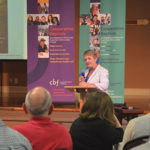Posted: 6/13/06
Rogers' widow cautions
against narrowing fellowship
By Jennifer Rash and Erin Tunnell
The Alabama Baptist
| SBC Annual Meeting |
GREENSBORO, N.C.—Adrian Rogers’ widow captured unexpected attention at the Southern Baptist Pastors’ Conference by asserting her husband would not approve of narrowing parameters of fellowship in the Southern Baptist Convention.
Joyce Rogers — whose deceased husband was a former Southern Baptist Convention president and longtime pastor of Bellevue Baptist Church in Cordova, Tenn. — cautioned Southern Baptists about the current state of affairs.
“Adrian Rogers would not have been a part of some things going on today, getting narrower and narrower about some issues,” she told the crowd, who welcomed her with a standing ovation.
Although he would try to convince someone of his viewpoint if that person disagreed, Rogers would not exclude someone from service because of the disagreement, she noted.
“Adrian Rogers was a gracious man who worked for unity in body of Christ,” Joyce Rogers said. “He believed with all his heart inerrancy was a hill to die on. But he still sought unity in the body of Christ.
“Will you continue this race that one ran so well with truth, courage and integrity? Be men of integrity, pure and faithful to the end. … I want to challenge you pastors to be courageous, always standing for moral truths and what is right no matter the cost.”
Ed Young, another former SBC president and pastor of Second Baptist Church in Houston, told the conference crowd: “Southern Baptists have forgotten who they are. And because of this, we do not know where we are going. I believe that we as Southern Baptists are on way, way, way too many side streets.”
Theologically, Southern Baptists believe in biblical inerrancy, he insisted.
“We believe in the virgin birth of Jesus Christ,” he said. “We believe in the perfect life of Jesus Christ. We believe in the substitutionary atoning death of Jesus Christ. We believe that in three days Jesus Christ rose. We believe in the ascension of Jesus Christ and the soon coming of Jesus Christ.”
Young continued, “Our theology is biblical, it is not systematic. Therefore we as Baptists, we are not Calvinist; we are not Armenian; we are Baptists. That’s who we are, and we always come down somewhere in the middle.”
Functionally, Southern Baptists have the Great Commission as their mission statement, Young said. Their marketing strategy is to reach Jerusalem, Judea, Samaria and the ends of the earth.
“And when you forget who you are—a Great Commission people—you do not know, do not see where you are going and you end up on side streets,” he said.
He noted that he saw no evidence of going off on side streets in the Southern Baptist seminaries, in some churches and state conventions or in the International Mission Board.
With more than 100,000 churches internationally and 5,000 missionaries in service, the IMB was instrumental in seeing 459,000 people baptized in 2005, he noted. That was 86,000 more than were baptized in America’s 42,000 SBC churches, he said.
Where this shows up most tragically, Young said is in the number of people aged 18 and under in Southern Baptist churches who are not being saved.
“The kids brought up in your church and my church, six out of eight have not been won to Christ, and as far as we know, they are gone to the kingdom of God,” Young said.
“We need to get back in the youth business with our kids.”
Referencing Mark 10, where Jesus allowed the children to come to him, Young said, “He (Jesus) said once and for all children — young people — are the very center of the kingdom of God.”
As churches reach out to children, they will gain an audience with their parents and will have a chance to witness to the entire family.
This is the same methodology used by the IMB with unreached people groups, Young noted.
“When you have a place where kids are really loved and ministered to, it will turn your evangelism around,” he said.
Southern Baptist churches also need to double their commitment to international missions.
“We need to say to Dr. (Jerry)Rankin, (IMB president,) ‘We want 10,000 missionaries on the field within two years,’” Young said.
But above all “we’ve got to have a supernatural healing in the SBC; a healing of relationships,” he said. “I was there through all the bloody battles but let me tell you something, we all believe this book (the Bible). We don’t need all of this fighting and cutting and hard line and ruling out.”
When the SBC begins to focus on children, gives to missions and works to bring about supernatural healing, then “we can be a part of the wonderful thing of reaching the world for Christ,” Young said.
“When this takes place, we’ll remember who we are, we’ll see where we’re going, we will repent with tears … and we will no longer be on side streets.”
















We seek to connect God’s story and God’s people around the world. To learn more about God’s story, click here.
Send comments and feedback to Eric Black, our editor. For comments to be published, please specify “letter to the editor.” Maximum length for publication is 300 words.